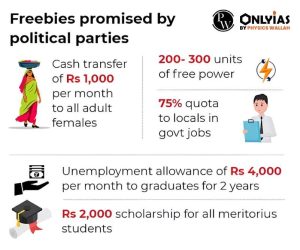Context:
- This article is based on an Editorial “Code of conduct’ on freebies needed” which was published in the Business line. Recently, the Congress Party has promised six huge guarantees (freebies) for the upcoming Telangana elections, however with reference to their funding, the party has provided no clue.
What are the Freebies?
- The term ‘freebie’ in the dictionary refers to an item or service that is offered or delivered without any cost. The Reserve Bank of India (RBI) issued a definition for the term ‘freebies’ as a form of public welfare programme that is offered without any cost.

What are the Arguments against Freebie Politics?
- Against the Democratic Value: In a mature democracy, a political party only owes good and corruption-free governance, while delivering good governance is difficult, fulfilling promises on freebies is simple.
- Ignoring Rational Economic Management: Indian voters are attracted towards freebies politics rather than rational economic management, which has been proved repeatedly in Punjab, Rajasthan, Chhattisgarh, Jharkhand and Delhi.
New Pension Scheme (NPS) vs Old Pension Scheme (OPS)
- Pension Liability: NPS limits the State’s pension liability only till the employee’s retirement, unlike the OPS which imposes an indefinite pension liability upon the States.
- States’ Actions: Rajasthan, Chhattisgarh, Jharkhand, Punjab, and Himachal have already reverted to the OPS, and West Bengal did not even implement the NPS.
- Burden on Exchequer: As per RBI study, the burden of the OPS upon the exchequer is 4.5 times higher than that of the NPS.
|
- Plight of States: Freebies worth ₹55,000 crore is driving Punjab, already the highest indebted State, towards bankruptcy, and election guarantees in Karnataka worth ₹62,000 crore (3 percent of GSDP) will also get a similar turn.
ALSO READ: One Nation One Election Explained
Role of Finance Commission (FC) on Freebie Politics
- Only a Constitutional body for the devolution of federal resources to States.
- It hardly has the authority, legitimacy or competence to deal with such freebies politics.
- The 15th FC was asked to look into this issue of freebies and is likely to be referred again to the 16th FC which is about to be constituted.
Role of Supreme Court (SC) on Freebie Politics
- 2013: The SC observed that the distribution of freebies is against the free and fair elections and violates the electoral process.
- The SC directed the Election Commission (EC) to frame appropriate guidelines with reference to freebies.
- However, the EC only provided a vague guideline requiring the parties to state the plans for financing of the freebies promised.
- 2021: The SC called for an Expert Panel to be constituted comprising all stakeholders to consider this issue but nothing has come out so far.
The Path Ahead for Freebie Politics
- Yes, it would be difficult to restrain the political parties from promising freebies , but may be through an amendment in the Representation of the People Act (RPA), it could be sorted out to an extent by mandating following principles to disclose:
- The estimated the cost of the promised freebies
- Mode of financing them either by raising taxes or by curtailing revenue expenditure (not capital expenditure), but never through additional borrowing
- The revenue deficit finalized by the FC cannot be exceeded on account of the freebies.
- It can be effectively addressed only by the legislatures through consensus between political parties.
Conclusion
The trending culture of freebie politics in India raises concerns about fiscal responsibility and democratic values. Addressing this concern requires a comprehensive approach, including legislative amendments mandating transparency in cost estimation, financing methods, and adherence to fiscal limits, fostering consensus among political parties to ensure free and fair elections.
| Attempt the PY Prelims Question
Consider the following statements: (2017)
- The Election Commission of India is a five-member body.
- The Union Ministry of Home Affairs decides the election schedule for the conduct of both general elections and bye-elections.
- Election Commission resolves the disputes relating to splits/mergers of recognised political parties.
Which of the statements given above is/are correct?
- 1 and 2 only
- 2 only
- 2 and 3 only
- 3 only
Ans: D |
![]() 5 Oct 2023
5 Oct 2023
